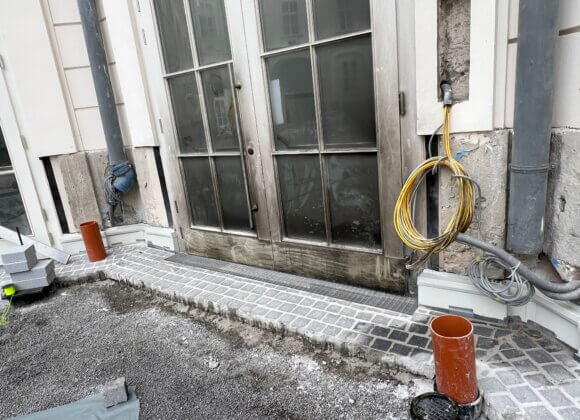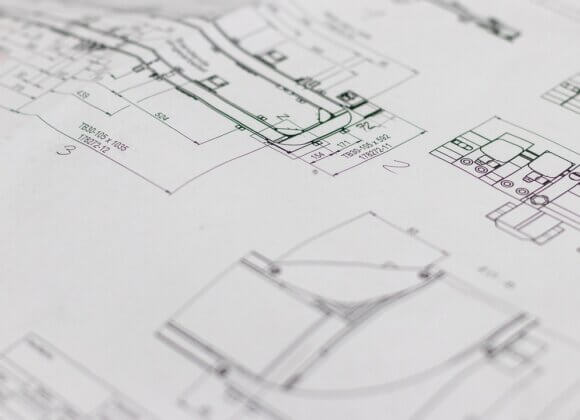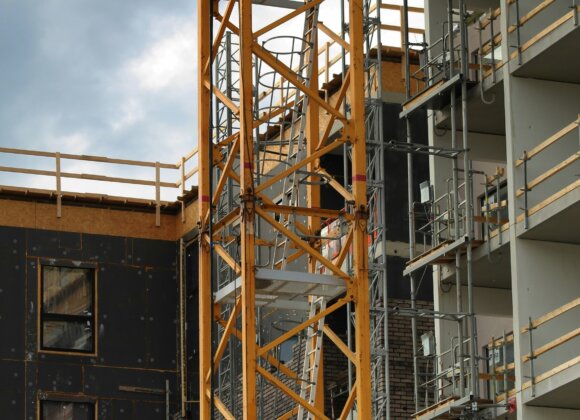Botched construction is an issue that often presents building owners with immense challenges. Clear contract drafting is the key to avoiding mistakes and misunderstandings in advance. In this interview, Dr. Daniela Witt-Dörring explains what legal and practical measures builders should take to protect themselves.
Dr. Witt-Dörring, what types of contracts are commonly referred to as “construction contracts”?
A distinction must be made between two basic types of “construction contract”: On the one hand, the “building contract”, sometimes just called the “construction contract”, which regulates the execution of certain construction services. It is concluded between the owner of an undeveloped property – in the case of the construction of a new house – or the (apartment) owner or tenant of a property to be thoroughly renovated as the “client”, and a construction company as the contractor.
On the other hand, there is the property development contract, in which the client of the property developer also acquires the property to be built on or shares in the property from the property developer. And the developer undertakes to provide the construction services up to the agreed degree of completion of the apartment and/or house, or to have them provided by third parties. In the latter case, the “building contract” described above, usually in the form of a “general contractor agreement”, is concluded between the property developer and the company carrying out the construction work.
What essential contractual content should a building contract/construction contract include in order to avoid legal disputes?
It is important to ensure that the construction (works) contract precisely defines the main contractual services of both parties. This includes the price to be paid by the client in terms of amount (fixed price, indexation) and due date (payment schedule, partial invoices, interim acceptance) as well as, and this is the more complex part, the services owed by the construction company. Furthermore, ancillary provisions that include the construction period, the completion date, reciprocal information obligations and inspection rights of the client, regulations on the warranty and a liability waiver. And – also very important – what the consequences are if one of the parties to the contract does not fulfill its obligations in accordance with the contract during the execution phase (default, penalties, rights of withdrawal). The higher the contract sum, the more sophisticated the contract should be. It should also provide for reciprocal guarantees and the conclusion of insurance policies by both parties to the contract. Legal and technical advice should always be sought when drafting a construction contract.
What is essential to contractually define the scope of services of the executing company?
A detailed building description is required here, for which technical experts must be consulted in any case. Part of this description can be taken from the approved plans, but a description of the materials and qualities, the requirements for the building services, the type of construction, architectural and aesthetic aspects (colors, surfaces, coverings), etc., as well as a detailed description of the equipment, which must also specify the products and manufacturers to be used, is also required. A WC is not a WC, a light switch is not a light switch – here too, a private builder is overwhelmed without expert advice, not least due to the variety of products on offer and the lack of knowledge about a reasonable price-performance ratio. For larger building projects, this advice should therefore not only be obtained from the supplier, but also from independent, technically experienced industry insiders. Aesthetic aspects such as color, shape and surface design are often overestimated by private builders, while technical, functional and energy-related aspects are underestimated.
Why is it so important to specify the scope of services to be provided by the contractor in detail in the construction (works) contract? How is monitoring carried out?
A detailed and practicable service description is the only way to check whether the construction company is fulfilling its contractual obligations. This ensures that the client’s expectations, which form the basis of the price agreement, are met. It is also the case that a “strict” contract increases the quality of execution because the contractor knows that he can be held financially accountable in the event of “underperformance”. It is also very important that the quality of the construction work is continuously monitored during the construction phase. If checks are only carried out on completion and handover, many defects are no longer recognizable due to the nature of the construction process and only become apparent over time during use. It is then often too late for the client to assert their claims, or they have to contend with considerable difficulties in providing evidence regarding the identification of defects.
What are the formal requirements for a building (works) contract?
A building (works) contract can “in theory” also be concluded verbally with legal validity. However, it follows from the above that only a written version is recommended. The contract should therefore contain a written form clause, which also stipulates that all ancillary agreements, any additions to the contract and amendments to the contract must be made in writing. All important notifications between the contracting parties must also be made in writing, whereby notifications that are critical in terms of deadlines – for which the time of dispatch is important – should also be sent by Reco letter. Simple e-mails do not fulfill the written form requirement. Electronic signatures are becoming increasingly popular in practice and are also valid if the requirements are met.
What contractual content may be void or contestable in the construction industry, and how can you protect yourself against this?
As the private client is normally a consumer and the contractor is an entrepreneur, the comprehensive legal protection provided by the Consumer Protection Act (only) applies in favor of the client. Void or contestable provisions therefore usually only adversely affect the contractor. An exception would be an overly imprecise specification of services, which could lead to a contract not being concluded at all – this is known as “dissent”. This would also have a negative impact on the client if they had relied on the contract being concluded.
Nevertheless, for reasons of legal certainty, it is recommended that both parties to the contract pay attention to sufficiently specific, transparent and clear contractual provisions. See also the comments on the requirement for detailed specifications above.
What legal instruments do you recommend to minimize the risks of construction errors or breaches of contract?
What you should or need to consider:
- Check the provider’s creditworthiness before concluding the contract (note: an unusually low offer price is a “red flag”).
- Clear and detailed contract concluded with the advice of legal and technical experts.
- Avoidance of excessive “advance payments” (advance payments or due dates brought forward at the request of the contractor).
- Ongoing monitoring and documentation of the construction work during the construction phase by technical experts.
- Final acceptance accompanied by technical experts, which is documented or confirmed by experts if performance is inadequate. If there are significant defects, acceptance must be refused.
- Agree a liability waiver.
- Conclusion of insurance policies.
- Retention of all correspondence (including pre-contractual correspondence).
- Structured and dated storage of photos.
- Notification of deadlines (e.g. expiry of the warranty period) with sufficient advance notice to enable measures to be taken.
- Immediate written notification of defects if defects become apparent.
- Preservation of evidence in court if points of dispute arise.
- Take out legal expenses insurance that covers disputes arising from construction contracts/acquisition of land (also in this regard: seek advice at an early stage, as waiting periods between the conclusion of the insurance contract and the start of the planning process/conclusion of the construction contract or property development contract must be observed in order for cover to be provided).
And last but not least: Good nerves and good luck in your new home!

Partner at Weber Harrer Rechtsanwälte GmbH & Co KG in 1010 Vienna
Photo credits: Photo studio HUGER
Related posts:
Botched construction: What is the best way to take precautions?












